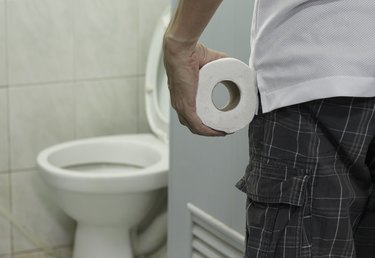
Wow. This morning has been something else. You woke up with diarrhea. Aside from being sick, it might also have to do with what you ate, an as-yet undetected GI condition or even the monster to-do list you have brewing today.
Here's what's up — and what you can do about it.
Video of the Day
Video of the Day
1. You’re Worried About All the Things Today
Not everyone feels well-rested when they get up — and you might be swimming in worries about what's on your plate (e.g. a ton of to-dos, a not-so-pleasant meeting with your boss, a worrisome visit to the doctor, news from a friend).
When you're stressed, your body releases cortisol — the fight-or-flight hormone — and two things can happen in terms of your gut function: you can get diarrhea or constipation, plus bloating and flatulence, Monica S. Borkar, MD, a gastroenterologist with NorthShore University HealthSystem in Glenview, Ilinois, tells LIVESTRONG.com.
Fix it: Taking care of yourself will help out your gut.
"Getting enough sleep, eating a healthy diet, drinking at least 64 ounces of water daily, avoiding caffeine, alcohol and tobacco and exercising can help your gut-brain axis get back on track," she says.
Related Reading
2. You Overserved Yourself Last Night
Alcohol tends to cause diarrhea, Dr. Borkar says. Imbibing too many IPAs or glasses of vino can cause the runs the next morning because you're drinking more fluid and alcohol might change your gut microbiome in ways that alter your BM habits.
Another possible related factor: Midnight snacking, she says. If you drank alcohol and then followed it up by diving into the chips or slices of pizza to quell the booze-induced munchies, then you can see why your BMs are making themselves known this morning.
Research in the Asian Pacific Journal of Cancer Prevention in 2019 suggests that diarrhea following drinking is associated with an increased risk of developing colorectal tumors, so this isn't a sign you should just brush off if it happens to you regularly.
Fix it: To reduce the risks associated with drinking, the Centers for Disease Control and Prevention recommends those assigned male at birth limit themselves to two drinks per day while those assigned female consume no more than one per day.
3. You Took a Laxative a Couple Days Ago
If you're constipated, OTC laxatives can be tricky — they don't produce pooping immediately.
"Most over-the-counter laxatives can take anywhere from 8 to 72 hours to work," Dr. Borkar says.
If you popped one a couple of days ago, now just might be your time to have a BM.
Tip
Talk to your doctor before starting any of these medications, Dr. Borkar advises: “They can interact with other medications you are taking and have the potential to cause incontinence.”
4. You’re Sensitive to Your Nighttime Treat
Did you hit the pint of low-cal ice cream hard last night? Some artificial sweeteners and sugar alcohols in these types of desserts and other foods are associated with GI complaints, like bloating or diarrhea in some people, Dr. Borkar says. Dairy can loosen your stools, too, if you're sensitive to lactose, the sugar found in milk.
Fix it: If you notice that this happens frequently after you eat certain foods, you can try avoiding them to see if that quells your symptoms.
For a more thorough investigation to pinpoint your GI triggers, talk to a registered dietitian or your doctor.
5. You’ve Got the 'Stomach Flu'
The "stomach flu" (read: viral gastroenteritis) can seemingly strike out of nowhere. You go to bed fine — and you wake up with watery diarrhea (that has no blood), stomach pain, nausea, vomiting, a headache and a fever.
Fix it: Unfortunately, there's no treatment for this bug, notes the Mayo Clinic. And sometimes it's tough to know what got you sick in the first place, because the symptoms can appear several days after you came in contact with the contaminated food (or water).
You can make yourself more comfortable by avoiding mediations like NSAIDs that can cause stomach upset, avoiding food until your stomach starts to feel better and taking small sips of water to avoid dehydration. And let your doctor know if symptoms don't subside in a couple days.
6. You’re Pregnant
Pregnancy is another contributor to morning diarrhea, Dr. Borkar says.
The American Pregnancy Association notes that this not-so-great symptom can be chalked up to newfound sensitivities to foods that didn't bother you before or hormonal changes that slow digestion.
Tip
If you have diarrhea, make sure you’re drinking adequate fluids to avoid dehydration, which can be dangerous during pregnancy. And if it's persistent, definitely mention it to your ob-gyn.
- Asian Pacific Journal of Cancer Prevention: “Impact of Diarrhea after Drinking on Colorectal Tumor Risk: A Case Control Study”
- Centers for Disease Control and Prevention: “Dietary Guidelines for Alcohol”
- Mayo Clinic: “Viral gastroenteritis (stomach flu)”
- American Pregnancy Association: “Diarrhea in Pregnancy”
Is this an emergency? If you are experiencing serious medical symptoms, please see the National Library of Medicine’s list of signs you need emergency medical attention or call 911.